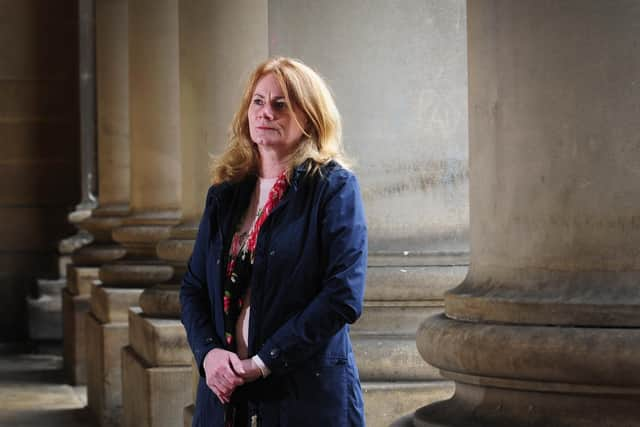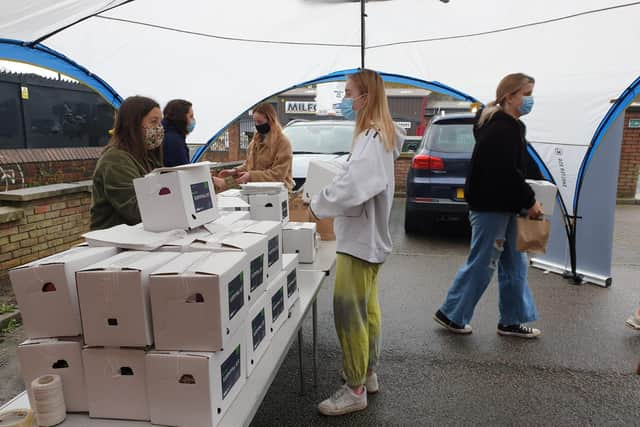'They are a vulnerable group that no-one is taking notice of': Fears over mental health impact of Covid-19 pandemic on Leeds university students
and live on Freeview channel 276
Thankfully that was 2017 and she was free to visit other flats, socialise with whoever she wanted and travel home as and when she liked - simple “lifelines”, she said, which “got her through” that first year.
But the reality for this year's new intake of students is very different.
Advertisement
Hide AdAdvertisement
Hide AdThrown together with strangers, in an unfamiliar city, with virtual lectures, banned from mixing with other households and discouraged from travelling home - essentially “trapped,” says Caitlin, who is now in her third year at the university.


Caitlin, 21, said: “I take myself back to being in that flat [in my first year] and I would have felt so trapped in those four walls of my room, especially with home visits not allowed. It brings home how difficult it must be for people who are in that situation and live with strangers or people they used to be friends with and now aren’t.”
The reasons why are clear - the coronavirus swept through universities once students arrived from September, with 1,310 cases being reported at the University of Leeds alone between September 28 and November 1.
But for those who still made the choice to start university, the current situation is far worse than they imagined, says Caitlin.
Advertisement
Hide AdAdvertisement
Hide AdUniversities have told the Yorkshire Evening Post they have made "significant" changes to the their mental health provision in light of the pandemic, but Caitlin said it feels like there has been a lack of support from the Government and university.


“It literally doesn’t feel like uni at all. The general consensus is people are just trying to do the best in a bad situation.
“We don’t necessarily feel as though the mental health support has varied at all from the normal message we’re given from university in a normal year. This is quite baffling given how much students' lives have had to adapt.”
She added: “I really don’t think any of this was thought through. There might be a high amount of students dropping out or [their mental health] deteriorating quickly.”
Advertisement
Hide AdAdvertisement
Hide AdTheresa Kirk, who runs student mental health support charity It’s Our Day, said many have told her they feel “totally at sea with no support” and warned the pandemic is compounding what was already a mental health “crisis” among the student population.


Before Covid hit, the charity’s weekly breakfast club in Hyde Park was already being inundated with students and Theresa now fears that level of need is going to increase exponentially as the pandemic continues to take its toll.
She said: “The crisis with mental health among young people existed pre-Covid."
“We need to acknowledge that and then take into consideration the added impact of now going off to uni and being in complete isolation.
Advertisement
Hide AdAdvertisement
Hide Ad“It would be difficult anyway had they been at home with networks and friends but they’ve been encouraged and almost convinced that there is some kind of uni life for them.


“They have moved away from home, been put in a city they have no knowledge of, where they know no-one, and been put in lockdown.
“That is going to have an enormous impact on mental health. The services that were there before Covid weren’t able to meet the demand and that’s just added to the situation.
“So the numbers that we were seeing are only going to be on the increase.
Advertisement
Hide AdAdvertisement
Hide Ad“The students that we are talking to at breakfast club are saying the universities are trying but in the main there is no support there. They feel totally at sea with no support.”
Theresa, 58, of Wrenthorpe, Wakefield, founded her charity, originally called ‘Emma’s Embrace’, in memory of her daughter Emma who was a 20-year-old student at Leeds Beckett University when she ended her own life in the early hours of October 27 2018 after a night of drinking with her friends.
The charity now goes by the name 'It’s Our Day' to emphasise the unique challenges and pressures facing students in today’s modern world and for Theresa, her work provides the opportunity channel her grief into trying to stop others suffering the same fate as Emma.
She said: “Emma wasn’t a dark soul that lived in a dark place when she did what she did. It was following a drunk night in her darkest hour before dawn and she made a stupid decision.
Advertisement
Hide AdAdvertisement
Hide Ad“She came in from falling out with her boyfriend and stormed up to her bedroom and did what she did. It was a chain of events at that moment and if any one was different, we wouldn’t be where we are.
“But that being said, she did struggle with anxiety and that feeling that the world generally didn’t give a cr*p about anything.”
But Theresa said the “sales pitch” of university being a chance to experience how to live independently for the first time can cause some to become dangerously isolated from their support systems.
“If I had realised…. I believed the marketing, I believed the sales pitch - ‘Let them be, don’t be pestering, leave them to it.’ Emma believed the sales pitch too - that ‘I’m an adult now’.”
Advertisement
Hide AdAdvertisement
Hide AdCiting examples such as that student housemates rarely swap family’s numbers in case of concerns and alarms are rarely raised if a student fails to attend lectures for a number of weeks, she said: It’s more [that they have] to just live without any support network at all.
“For me, it’s important that everyone understands the reality of it. We all might make different decisions.”
It’s Our Day launched its Breakfast Club outreach project, partnering with Leeds mental health information portal Mindwell, in October 2019, providing what Theresa says appears to be the only support of its kind to students in the city.
With the offer of a free hot sandwich in a friendly environment, students could come and socialise - with added extras of board games and a guitar - in a room staffed by volunteers including social workers and a therapist who were able to listen and signpost students or help them integrate with peers.
Advertisement
Hide AdAdvertisement
Hide Ad